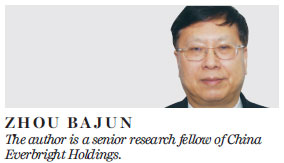What HK can learn from Macao
Updated: 2015-12-23 09:17
By Zhou Bajun(HK Edition)
|
|||||||
Zhou Bajun writes that Hong Kong's greatest advantage - which it must continue to maximize to the fullest - is its growing integration into the national economy
The State Council on Dec 16 passed the Map of the Macao Special Administrative Region of the People's Republic of China (Draft). The map shows the official boundaries of the Macao SAR on land and sea. The territorial waters under Macao's jurisdiction cover an area of 85 square kilometers; while its land area has been expanded to include the area around the Border Gate Checkpoint Complex, formerly under the jurisdiction of the neighboring Zhuhai city, and much more besides. The new map means Macao's total area will be four times larger than it is now (about 30 square kilometers) once it is approved by the National People's Congress.
Earlier this year, the Shanghai Academy of Social Science published a research paper on the conceptual direction of the municipality's 13th Five-Year Plan (2016-20). It suggests a "1+5" city cluster should be established around Shanghai. This includes Suzhou, Wuxi, Nantong, Jiaxing and Huzhou. The idea is based on the fact that many of the world's metropolitan cities are supported by smaller cities around them. For example, Japan's Tokyo is surrounded by three prefectures. The "1+3" city cluster covers an area of 13,400 square kilometers. The proposed Shanghai city cluster will boast an area 100 kilometers in radius - and it should play a crucial role in the development of the Yangtze River Economic Belt.
The two events mentioned above should inspire Hong Kong to reconsider its own place in regional, national and global economic developments.
Macao's socio-economic development has long suffered from land shortages. This is why the SAR government and local community have been petitioning the central government authorities for years to give them more land. Now that its wish has been granted, Macao is expected to reclaim more land from its expanded waters.
Hong Kong in comparison boasts a much bigger area of more than 1,100 square kilometers - about 40 percent of which is occupied by country parks. That means 60 percent or more than 600 square kilometers of Hong Kong's land is theoretically available for use by some 7.2 million residents. However, land and population are not the only deciding factors in a city's development. It is also determined by regional and global development trends and other things. Modern economies are largely driven by commodities and currencies and have never been restricted by administrative zoning.
The exchange of commodities and currencies has never been restricted by national boundaries, either. In recent years, particularly with the spread of the Internet, the entire world has become a virtual marketplace. It is safe to say globalization is the ultimate characteristic of the modern economy, particularly in regard to commodities and currencies.
In the 1980s, when Hong Kong was still under British jurisdiction, economic realities prompted most of Hong Kong's manufacturers to move their production facilities to Guangdong. The northward "exodus" forged an inseparable economic bond between Hong Kong and the mainland that has only expanded substantially in the past three decades. As a result, members of the local business community and economists started debating Hong Kong's development strategy and two schools of views emerged. One can be summarized as the "hollow-up" theory and the other as the "balance-out" theory. The "hollow-up" theory advocates concentrated efforts on developing the service industry; while the "balance-out" theory maintains Hong Kong should expand its high-tech manufacturing sector and broaden its industrial base. I was one of those advocating the latter at the time.
One would think those who support the "hollow-up" theory should have no problem welcoming mainland consumers to spend in Hong Kong, but surprise! Many of them have become fans of the mainland-phobic "localism", overtly or otherwise. No one should be surprised, however, that the opposition camp is generally very supportive of the "localist movement" no matter what its advocates say or do. Obviously anything that makes it hard, if not impossible, for Hong Kong to continue its integration into the mainland economy suits the opposition's political objective and is therefore worthy of their support.
Some Hong Kong people support "localism" because they are worried their "core values" will be eroded by "mainlandization". But simultaneously they want preferential policies from the central government to help Hong Kong's economy - particularly in difficult times. The problem is they cannot have both. Economic integration with the mainland is determined by globalization, not by Hong Kong or any other entity. If Hong Kong wants to remain relevant in the global economy it must use its greatest advantage to the full - its deepening integration into the national economy. The city has to play a major role in the Pearl River Delta regional economy first, by joining forces with Shenzhen. This is why Macao and Shanghai make sense as examples: Go with the tide of the times and lose self-imposed boundaries.

(HK Edition 12/23/2015 page9)